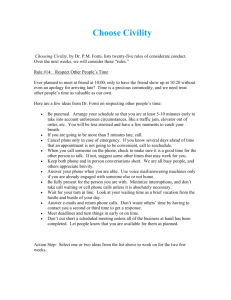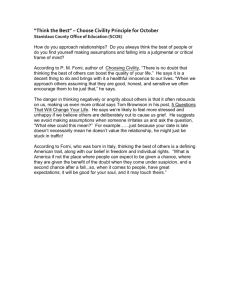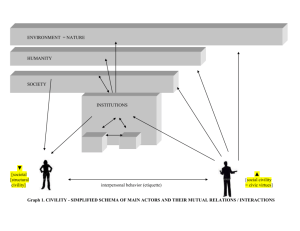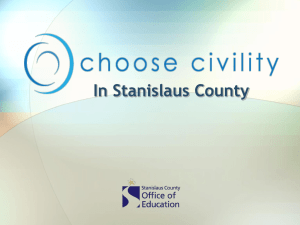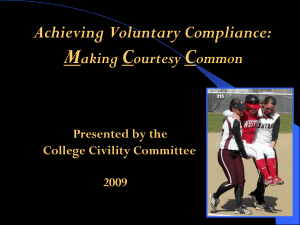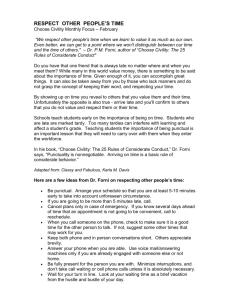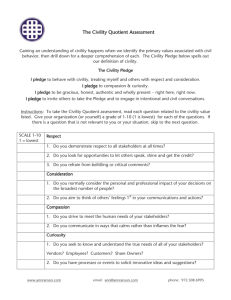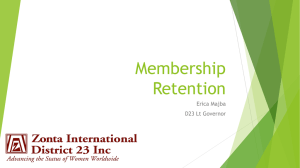Pilot Survey Report - Monroe Community College
advertisement
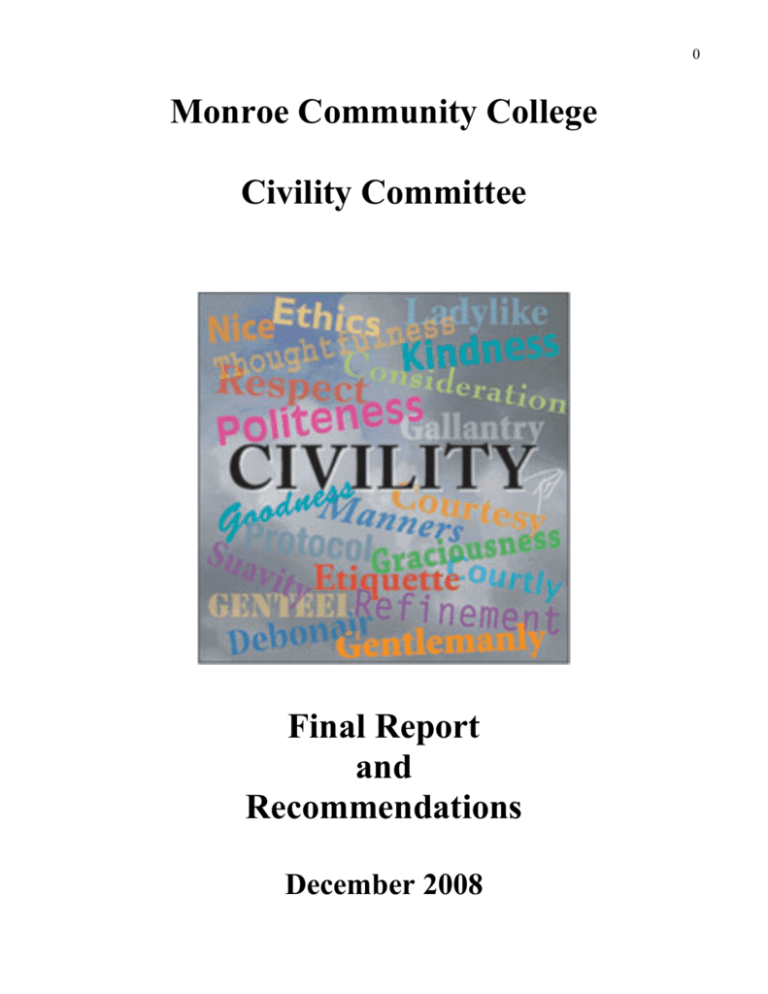
0 Monroe Community College Civility Committee Final Report and Recommendations December 2008 1 Summary The MCC Civility Committee was formed in November of 2006. The President of the Faculty Senate (Terri Tugel) sent a general e-mail to the faculty members and received over 50 e-mails from interested faculty who volunteered for our committee. We selected three faculty members, representing three academic areas (business, math and biology). We also reached out to our various student groups and organizations and identified three students to join our taskforce. We also included our Director of Human Resources, Director of Housing and Residential Life, Director of the Campus Center, Director of Athletics, and several other administrative representatives from throughout the campus. The result was a committee of sixteen (16) committed members of our student, faculty and staff. The members of our committee are: Lee Struble, Public Safety Richard Ryther, Student Services Dr. Susan Baker, Student Services Susan Roxin, Counseling & Advising Marcia Marriott, Business Administration & Economics Richard Stewart, Math Paul Emerick, Biology Ann Topping, Student Services - DCC Julie White, Student Services - DCC Betty Stewart, Campus Center Gerald Burns, Admission Bruce Shapiro, Athletics Alberta Lee, Human Resources Shelitha Dickerson, Housing & Residence Life David Ladwig/Devin Lynch, Student Government Michael Sloyka, Housing & Residence Life Since November 2006, the Committee has been hard at work assessing the current climate and concerns on campus as they relate to civility and to prepare this final report and recommendations. The full committee met twenty (20) times during this period, with an additional number of smaller ad hoc committee meetings and independent research work done by many members of the committee. Our first several meetings were dedicated to information gathering and sharing regarding the existing civility efforts that are already in place at MCC and at other colleges and universities across the United States. The following civility statement had been adapted several years earlier by the college (poster is provided as Addendum I): “We, the students, faculty, staff and administration of Monroe Community College are committed to core values that include: • • • Creating an environment where we value and respect each other; Promoting a community that encourages the tolerance of divergent opinions and constructive resolution of conflict; Exchanging ideas and enriching our lives through the exploration of our multifaceted culture; 2 • • • • Embracing responsibility, integrity, and courtesy; Respecting the dignity, rights, and freedoms of every community member; Respecting the intellectual and physical property of others; and Respecting college property including both public and private spaces. We, as a community of learners, are affirming these core values to guide our actions and behaviors.” This statement has been used in a very effective poster campaign at the Damon City Campus, but was not used to a great extent on the Brighton campus. The recently adapted campus-wide “Three R’s” campaign (Respect, Responsibility and Reality) was also reviewed and discussed. As a result of our information gathering and sharing, we were able to identify several campus resources that were already in place to support our new campus civility effort. We also discussed various educational outreach models, passive learning and social norming philosophy. While we certainly weren’t experts yet, we did have a good sense of what was currently in place on our campus and a good understanding of some of the best practices and programs that were in place at other colleges and universities. At this point, our committee reached a consensus that an initial survey of our campus community would provide important information to our committee work and would also establish a baseline of our current campus culture. We researched and reviewed several campus survey instruments, but ultimately decided to create our own survey. A smaller ad hoc committee began designing the survey and presented the draft to the larger committee for further discussion and revision. The faculty members of our committee took a lead role in the design, implementation and analysis of the survey. Paul Emerick provided invaluable input into the research, design and substance of the survey; Marcia Marriott used one of her classes to administer the survey and Dick Stewart used a statistics class to analyze the data. 562 usable surveys were completed. 55% were female respondents and 45% were male. 96% were completed by students and 4% were completed by faculty or staff. We were able to breakdown demographics into age groups, ethnicity, and which campus they were located at the majority of the time. The results of the surveys can be found in Addendum II of this report. Following the survey, it was decided to share the survey results with the campus community in a series of open forums and to solicit feedback from each respective group. The results of these focus group meetings can be found in Addendum III of this report. A power point presentation was prepared with the survey results and representatives of the Civility Committee conducted focus group meetings for the following groups: Student leaders/students (SGA meeting) Residence hall students, Resident Assistant and athletes College Hour for Brighton students, faculty and staff DCC students and student leaders (Sega meeting) DCC faculty/staff The Civility Committee conducted a series of open brainstorming sessions to evaluate and interpret the survey and focus group information. Several committee members also conducted independent research to further evaluate other campus civility efforts across the nation. It was then decided to organize each individual suggestion that was solicited or proposed by committee members 3 into common groupings and to rank order each suggestion. As a result, Addendum IV is a complete rank order listing of all the civility recommendations. Our last priority was to compile a short list of major recommendations that the Civility Committee hopes will be given immediate and serious consideration by the MCC administration. The MCC Civility Committee has spent nearly two (2) years devoted to developing this report and final recommendations. It is our sincere hope and belief that a campus-wide effort to address civility will result in an improved overall campus climate and will emphasis the qualities that are so important in maintaining civility and mutual respect among all members of the campus community. Major Recommendations: 1. Create an on-going “Campus Civility Committee” (CCC) to coordinate all campus civility programs and initiatives. It is recommended that the Chair of this committee be a direct report to the Vice President for Student Services. It is also recommended that this committee meet a minimum of six (6) times per year and an annual report of goals and accomplishments be submitted. The CCC would also be responsible for developing a civility theme each academic year (Honesty, Respect, Service, Consideration, Profanity Free, etc.). 2. Establish a $5,000 annual budget for the CCC to support the many campus civility initiatives (printing costs, website design, Campus Civility Week activities, etc.). 3. Designate a Campus Civility Week early in the fall semester to focus on various aspects of civility. The movie “Pay It Forward” is an excellent way to begin discussion on the topic of civility. Members of the CCC could also staff informational tables, sponsor essay and poster contests and place table tent messages throughout the college. 4. Create a peer “Civility Ambassadors” program that would train students how to effectively deal with incidents of inappropriate behavior or acts of incivility. Peers could be teamed with volunteer faculty and staff mentors that conduct regular environmental scans of high traffic and problems areas. 5. Provide orientation and on-going training to faculty members to effectively deal with classroom behavior to optimize the classroom learning experience. Example: CCC members could offer ten (10) minute classroom visits to present a “Choose Civility Moment” message. Addendum V, titled “Classroom Management and Discipline” was drafted by CCC member Dick Stewart to present standard guidelines based on our committee work. Specific efforts must also be developed to reach the hundreds of adjunct faculty members that represent MCC. In surveys, students strongly express the desire for classroom expectations to be clearly outlined at the beginning of each course. 6. Begin our Civility Campaign by creating campus interest in the topic of civility by asking everyone on campus to read the Forni book “Choosing Civility”, to be followed by various group discussions on a formal (divisional) or informal (College Hour Brown Bag) basis. 4 7. Develop a short 10-15 minute Civility video/DVD that can be used in the classroom to address common civility issues and to introduce the campus community to the CCC initiatives. DCC has already produced a similar DVD that could be used as the basis for a updated version. 8. Develop positive messages and other social norming strategies whereby simple acts of civility and kindness are recognized and shared with the larger campus community (i.e. develop a “Kind Deed Card” that can be submitted to the CCC, recognize people for turning in lost & found items, encourage departments to submit names of staff who demonstrate excellent service and/or an extraordinary deed, etc.). 9. Create a community service opportunity for MCC students to visit area high schools to discuss college expectations and civility. 10. Create designated “Quiet” or “Study” areas and re-design lounge and common spaces to create better sound barriers and reduce vandalism. 11. Hire additional Public Safety Officers and invest in additional security technology to help reduce theft (number one issue among students), vandalism and other potential criminal activity. 5 Addendum I 6 Addendum II Civility Survey Results Once the survey instrument was developed, Marcia Marriott’s Management Theory and Practice (BUS 204-007) class willingly agreed to administer the questionnaire. Once their work was finished, they forwarded the completed survey forms to Dick Stewart’s Elementary Statistics (MTH 160-007) class for analysis. Following the input of the data from 562 questionnaires, (31 others were unusable because the demographical inputs were incomplete) the data was subdivided into several smaller groups and a Pareto analysis was completed for each. The subgroups included: overall total, gender, location, roles at MCC, age groups, and ethnic classes. Once each Pareto analysis was completed, the top 5 perceived acts of incivility within each grouping were identified and the results are noted below: Total: 1. Stealing 2. Damaging college property 3. Harassing racial, ethnic, or gender based comments 4. Not properly disposing of food/garbage 5. Loud and inappropriate language Gender (Male): 1. Stealing 2. Damaging college property 3. Harassing racial, ethnic, or gender based comments 4. Making physical threats 5. Littering Gender (Female): 1. Loud and inappropriate language 2. Damaging college property 3. Stealing 4. Not properly disposing of food/garbage 5. Taunting or belittling of others Role @ MCC (Faculty): 1. Stealing 2. Loud and inappropriate language 3. Damaging college property 4. Not properly disposing of food/garbage 5. Littering 7 Role @ MCC (Staff): 1. Taunting or belittling of others 2. Using cell phones/text-messaging during class 3. Inappropriate sexual gestures 4. Defacing college property/graffiti 5. Talking loud on cell phones in hallways Role @ MCC (Students): 1. Stealing 2. Damaging college property 3. Harassing racial, ethnic, or gender based comments 4. Not properly disposing of food/garbage 5. Littering Campus Location (Brighton): 1. Stealing 2. Damaging college property 3. Harassing ethnic, racial or gender based comments 4. Not properly disposing of food/garbage 5. Loud and inappropriate language Campus Location (Damon): 1. Stealing 2. Loud and inappropriate language 3. Damaging college property 4. Harassing racial, ethnic or gender based comments 5. Defacing college property/graffiti Campus Location (Other): 1. Stealing 2. Loud and inappropriate language 3. Smoking in non-smoking areas 4. Blocking stairways/halls 5. Arriving late/leaving early from class Age Groups (18->24): 1. Stealing 2. Harassing racial, ethnic, or gender based comments 3. Damaging college property 4. Making physical threats 5. Not properly disposing of food/garbage 8 Age Groups (25->34): 1. Damaging college property 2. Stealing 3. Loud and inappropriate language 4. Defacing college property/graffiti 5. Cheating/Academic dishonesty Age Groups (35->44): 1. Stealing 2. Loud and inappropriate language 3. Blocking hallways and stairways 4. Using cell phone/text-messaging during class 5. Harassing racial, ethnic, or gender based comments Age Groups (45->54): 1. Stealing 2. Loud and inappropriate language 3. Blocking hallways and stairways 4. Defacing college property/graffiti 5. Damaging college property Age Groups (55->64): 1. Loud and inappropriate language 2. Damaging college property 3. Not properly disposing of food/garbage 4. Littering 5. Making physical threats Age Groups (65 & up): 1. Defacing college property/graffiti 2. Talking loud on cell phones in hallways 3. Not properly disposing of food/garbage 4. Inappropriate public displays of affection in hallways 5. Harassing racial, ethnic or gender based comments Ethnic Groups (Asian or Pacific Islander): 1. Loud and inappropriate language 2. Blocking hallways and stairways 3. Harassing racial, ethnic or gender based comments in hallways 4. Harassing racial, ethnic or gender based comments in classrooms 5. Damaging college property 9 Ethnic Groups (African American): 1. Harassing racial, ethnic or gender based comments in classrooms 2. Cheating/academic dishonesty 3. Loud and inappropriate language 4. Stealing 5. Stealing Ethnic Group (Hispanic): 1. Damaging college property 2. Making physical threats 3. Loud and inappropriate language 4. Littering 5. Stealing Ethnic Group (Native American or Alaskan Native): 1. Using cell phones/text-messaging during class. 2. Taunting or belittling others 3. Stealing 4. Defacing college property/graffiti 5. Inappropriate public display of affection in hallways Ethnic Group (Caucasian): 1. Stealing 2. Damaging college property 3. Harassing racial, ethnic or gender based comments 4. Making physical threats 5. Not properly disposing of food/garbage Ethnic Group (Other): 1. Using profanity 2. Defacing college property/graffiti 3. Not properly disposing of food/garbage 4. Making physical threats 5. Damaging college property 10 A summary of the topics noted in the open-ended comments section of the survey include: Profanity Blocking hallways Dress code Graffiti Littering Harassment Racism Speeding Total 59 37 3 7 21 45 13 7 Class disruption Cell phone usage Smoking Public display of affection Fighting Stealing Loud and obnoxious Cheating 13 17 49 16 71 26 40 11 435 What can be done to improve civility?: More security officers Enforcement of rules Stricter rules Educate students 84 64 42 13 Total 203 Suggested programs to implement improvement: Conduct civility classes Make students aware More selective admissions Public humiliation Ice cream social 73 12 2 1 1 Total 99 The students in BUS 204-007 and MTH 160-007 should be commended for their efforts in collecting and analyzing the data. Their efforts will provide a good foundation for future endeavors to assess the collective attitudes and opinions of all of us. 11 Addendum III Focus Group Comments Rules/Regulations Faculty Focus Group (11/06/07, 12/10/07 and 2/4/08 @ DCC): • • • • • • • • • • • • • • • • • • • Greater definition of standards and what is expected of civil behavior Generation of Code of Conduct with Informed Consent by students Self Police/Enforcement (Students safe to approach uncivil behavior) Dress Code Violations result in referral and some type of civility training Go beyond writing up and ensure there are acknowledged consequences for uncivil behavior Violators involved in campus wide clean up/public service Need to communicate what is acceptable in the MCC community (The 3 R’s campaign) Buzz agents – generate interest and discussion in the college community “Civility Apprenticeship” – training to address incivility (empowering others) Being respectful when confronting Social norming – let students know what the rules are Have students sign a statement that they have read and understand the conduct regulations Involve the students in the process Faculty should lead by example (ex. cell phone policy) Students should be involved in creating class rules before syllabus is distributed All faculty and staff should accept the responsibility to confront inappropriate acts Faculty should assume the responsibility of their individual classrooms Should foster a social norming approach to dealing with inappropriate acts (reasonable request) Student Focus Groups (11/13/07 and 12/13/07): • • • • • • • • • • More fines Stricter penalties Make sure Resident Assistants and Desk Attendants enforce the rules Enforce rules (example: 25 ft. smoking rule across campus, including residence halls) More staff willing to enforce the rules Educate students about the rules and consequences Community service for smoking violations Civility fine (use fines for positive purposes) Require repeat rule breakers to attend educational sessions and ask them to address other students Positive reinforcement for good behavior 12 • • Citizenship/civility scholarship (could use fine funds to finance) No “fear” of getting in trouble here like there was in high school; therefore, no deterrent. DCC Student Focus Group (11/28/07): • More interaction and education with Public Safety (Chris Piro) 13 Non-Specific Suggestions Faculty Focus Group (11/06/07, 12/10/07, and 2/4/08 @ DCC): • • • • • Establishing a uniformity of behavior across the campus to better define what is expected of civil behavior Follow up on faculty responses as they were not a major participant in the survey Increased surveillance Establish appropriate guidelines for “Blue Tooth” and other technology while in the hallways On-line learning presents additional inappropriate issues/concerns 14 Education/Awareness Faculty Focus Group (11/06/07, 12/10/07, and 2/4/08 @ DCC): • • • • • • • • • • • • • • Awareness of respect and proper role modeling Civility as an orientation component Civility incorporated into the curriculum Faculty focus potentially during Campus Wide Faculty events such as All College Day Teacher/Faculty potentially a component of the EDU series Establishment of Civility Ambassadors Peer Education and establish a diverse delivery through peer education Conduct workshops on how to confront incivility Orientation program resented by peers to address civility Promote good deeds Need to educate students on how they affect each other Use “Guerilla Warfare” (i.e. posters in restroom, etc.) Specific signs such as “NO Sitting in the Hallways” are effective Need to find opportunities to reinforce the positive behaviors Student Focus Groups (11/13/07 and 12/13/07): • • • • • • • • • • • • • • • • • • • “Gotcha” notices to help reduce theft Educate the anti-theft message Set examples Incentives Email expectations Use flyers Faculty to hand out expectations Use Monroe Doctrine Use parking pass Video for Orientation Need to eliminate the 13th grade concept and help students understand that this is college More Diversity workshops for students Hold training for student leaders/students at-large/civil service programs/to achieve “voluntary compliance” from peers Use faculty for education about the rules Use campus community service as a disciplinary measure Add civility statement to course outlines Slurs: perhaps tie education into the curriculum – professional communication Mandatory civility class (MCC) Advocate in each high school (or any type of school) to educate before they get to college 15 • • • • • Consistent messages in all course syllabuses to help students understand acceptable behavior Help all members of the college community learn how to confront unacceptable behavior Workshops on progressive theories of child development Send students into high schools to do assemblies to discuss college expectations – greater impact from a college student - use student leaders “Start a revolution” - Be the change DCC Student Focus Group (11/28/07): • • • • Greater engagement of students re: theft prevention, etc. Educate for more responsibility for safekeeping of belongings Social norming approach to theft prevention, etc. Tip of the Month for faculty to share with classes 16 Environmental/Physical Faculty Focus Group (11/06/07 and 12/10/07): • • • • Create a “Graffiti Permitted Zone” More security officers in key locations and key times Wear IDs so we can address people by their names Structural changes / move furniture, etc. Student Focus Groups (11/13/07 and 12/13/07): • • • • • • • • • • • Create more “lounge” atmosphere (more couches/chairs; less tables, etc.) Spread areas out for less crowding conditions Better trash removal Add signage in lounges and cafeteria for disposing of trash Cigarette disposal at residence halls (better ash trays and disposal containers, 25 ft. rule at entrance, etc.) Create sound barriers in certain lounge areas (2nd floor lunge, etc.) More social gathering areas (lounges) throughout the campus where noise is not such an issue Remove housekeeping staff from lounge areas to send the students the message to clean up after themselves More visible trash receptacles Increase video surveillance – spend money now to perhaps save money in the long run. Graffiti Wall in a prominent place DCC Student Focus Group (11/28/07): • • • • • Too much “hanging out” in lounge areas Create designated “Quiet/Study Areas” Vulgarity/swearing should be enforced by peers Re-design the security desk areas so they don’t become “clogged” Need additional resources to keep students at DCC (Honor classes, more class selection, Child Care, etc.) 17 Classroom Faculty Focus Group (11/06/07 and 12/10/07): • • • • • Promote Civility discussion in the classroom and incorporate as part of the CIS Professionalism and Civility become a grade component Inform faculty what to do if there is classroom incident (more training) Classroom management workshops The longer my list of inappropriate behaviors in my syllabus, the more problems I seem to have (keep your lists short) • Be respectful of each other! Student Focus Groups (11/13/07 and 12/13/07): • • • • • Faculty training to develop sensitivity toward student issues (harassment, etc.) Have faculty discuss civility issues in every class so all students are reached Add the civility statement to all course syllabus More professors to call out rude behaviors (cell phones use, etc.) Teach professors to be more proactive/involved DCC Student Focus Group (11/28/07): • • • • • • Professors let students sleep in class Professors need to keep all students accountable (remain in command of the class) Lack of classroom management affects all students Cell phones should be turned OFF in all classes Consistent rules (uniformed) Professors should model the desired behavior (cell phone usage) 18 Addendum IV Civility Committee Rankings of Focus Group Suggestions Recommendations for Improvement in the Classroom: 1. State classroom expectations in all Course Information Sheets and require faculty to discuss civility issues in every class so that all students are reached. Require that professors call out rude behaviors (sleeping in class, using cell phones, etc.); to acknowledge and reinforce acts of civility; and to model the desired behaviors. 2. Set expectations re: civil behavior in the classroom, and limit them to a few of the most important ones. 3. Require students to exhibit professional and civil behaviors and consider using the observations of such behaviors as a grade component. 4. Conduct professional development sessions for faculty, including adjunct faculty, re: what to do if there is a classroom incident (classroom management workshops); conduct other sessions to help faculty develop sensitivities toward student issues (harassment, etc.); and teach professors to be more proactive and involved. Recommendations for Education/Awareness: 1. Increase awareness of civility issues by incorporating civility into curriculum, through educational sessions or a video at Orientation. 2. Require faculty to put a consistent message into each course syllabus, such as the civility statement, to help students understand acceptable behaviors. 3. Develop a program to promote and reinforce positive behaviors for students, faculty and staff using incentives and rewards. 4. Use campus community service as a disciplinary measure. 5. Focus on civility issues and how to confront incivility for the faculty during campus wide faculty events such as All College Day and as a component of the EDU series. 6. Establish “Civility Ambassadors” and other peer education programs so students have positive peer role models. 7. Develop a signage campaign throughout the campus to address specific inappropriate behaviors (i.e. No Sitting in the Hallway, No Blocking the Stairs, No Food in This Area, etc.). 8. Develop a required, mandatory “civility” class. 9. Develop more diversity workshops for students. 19 Recommendations for Rules and Regulations: 1. Develop a method for all students to receive the conduct regulations and civility standards and to acknowledge their understanding through informed consent. 2. Civil etiquette should be modeled by all staff and faculty at the College to reinforce appropriate behaviors for students. 3. Develop sanctions/consequences, community service, reflective papers and/or civility training for uncivil behavior. 4. Use flyers, e-mail, the Monroe Doctrine and all other forms of communication to regularly communicate civility concepts, issues, and expectations. 5. Generate interest and discussion from the College community concerning civility standards and social norming. 6. Provide training to the College community for methods of approaching/addressing uncivil behavior (civility apprenticeship). 7. Classroom civility and management should be the responsibility of faculty (leading by example, developing class rules with student involvement, signed consent agreements, social norming, etc.). 8. Send MCC students to high schools to help high school students understand what is expected of them when they enter college. 9. Use the social norming approach to educate students about civility and theft issues. 10. Identify students to work as ambassadors to educate on social norms and college pride. 11. Communicate the possible consequences of uncivil behavior and/or identify and reward good (civil) behavior. 12. Develop an educational campaign for theft prevention, responsibility for safekeeping of belongings, how to report theft or other crimes, etc. 13. Develop a “Tip of the Month” for faculty to share with their students. Non-Specific Recommendations: 1. Establish a uniformity of behavior across the campus to better define what is expected of civil behavior. 2. Increase surveillance capabilities on campus. 3. Follow up on faculty responses as they were not a major participant in the survey. 4. Establish appropriate guidelines for “Blue Tooth” and other technology while in the hallways. 20 Recommendations for Environmental/Physical: 1. 2. 3. 4. 5. 6. Create designated “Quiet/Study Areas”. Re-design lounge and common spaces (create sound barriers, etc.). Hire more Public Safety officers for key locations and key times. Create more lounge areas to reduce crowding conditions where noise is not an issue. Increase the use of video surveillance (spend money now to perhaps save money in the long run). Provide additional resources to keep students at DCC (Honor classes, more class selection, Child Care, etc.). 7. Create a “Graffiti Permitted Zone” in a prominent area. 8. Improve trash removal/more visible trash receptacles. 9. Add signage in lounges and cafeteria for proper disposal of trash. 10. Require everyone to wear their IDs so we can address people by name. 11. Encourage vulgarity/swearing to be enforced by peers. 12. Create more of a “lounge” atmosphere (more couches/chairs; less tables, etc.). 13. Improve cigarette disposal at the residence halls (better ash trays and disposal containers, 25 ft. rule at entrance, etc.). 14. Remove housekeeping staff from lounge areas to send the students the message to clean up after themselves. 15. Re-design security desk areas so they don’t become blocked. 21 Addendum V Guide for Classroom Discipline and Management Classroom discipline and management causes the most fear and consternation in teachers, especially those new to the profession. Classroom management is a learned skill and must be practiced daily. The data collected during the MCC Civility survey suggest the following tips: 1. Set your standards early. Students quickly assess the situation in each class and realize what they will be allowed to get away with. Once you set a precedent of allowing a lot of disruptions, it can be very hard to regain order. 2. Be consistent and fair. You must act fairly for all students if you expect to be respected. Make sure that if your best student does something wrong, she/he gets disciplined for it too. One of the worst things you can do as a teacher is to enforce your rules inconsistently. If one day you ignore misbehaviors and the next day you jump on someone for the smallest infraction, your students will quickly lose respect for you. Your students have the right to expect you to basically be the same every day. Moodiness on your part is not allowed. 3. Manage disruptions with as little interruption as possible. When you have classroom disruptions, it is imperative that you deal with them immediately and with as little interruption of your class momentum as possible. If you have to stop the flow of your lesson to deal with disruptions, then you are robbing students who want to learn of their precious in-class time. 4. Do not confront a student in front of other students. Deal with discipline issues privately and allow the student to “save face.” 5. If possible, use humor to stop disruptions. Sometimes all it takes is for everyone to have a good laugh to get things back on track in a classroom. It is easy to confuse humor with sarcasm. Use your best judgment, but realize that what some people think as funny, others might find to be offensive. 6. Set and keep high expectations in class. Expect that your students will behave, not that they will disrupt. Reinforce this with the manner in which you speak to your students. Tell your students your expectations. For example, you might say, "During this whole group session, I expect you to raise your hands and be recognized before you start speaking. I also expect you to respect each other's opinions and listen to what each person has to say." 7. Over-plan your lessons. Free time is something teachers should avoid. By allowing students time just to talk each day, you are setting a precedent about how you view academics and your subject. To avoid this, over-plan. When you have too much to cover, you'll never run out of lessons and you will avoid free time. 8. Start fresh each day. You should start teaching your class each day with the expectation that students will behave. Don't assume that because a student disrupted your class yesterday that she/he will do so today.
